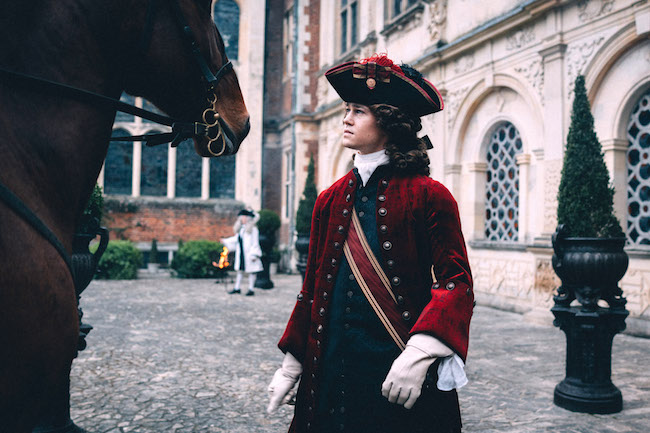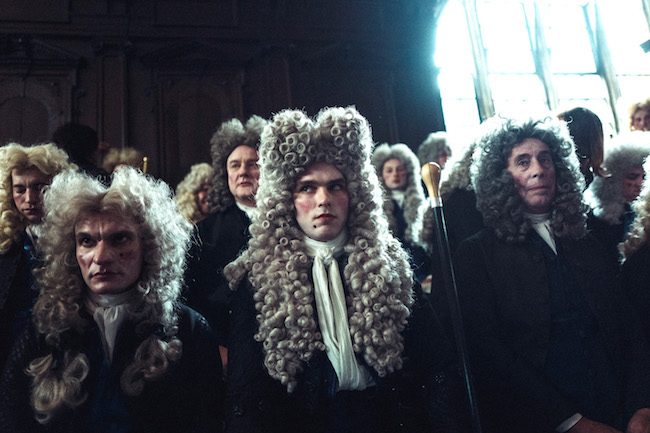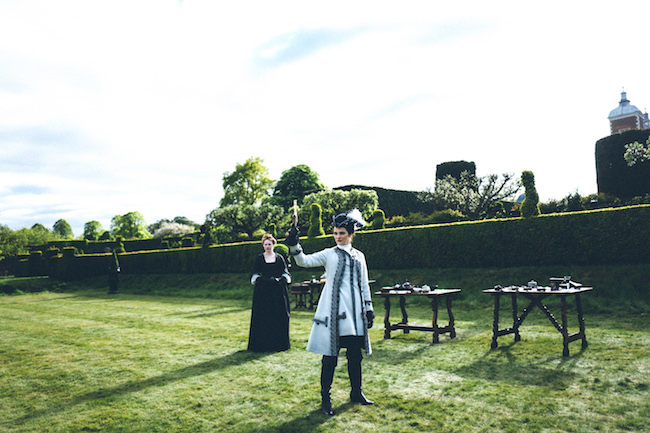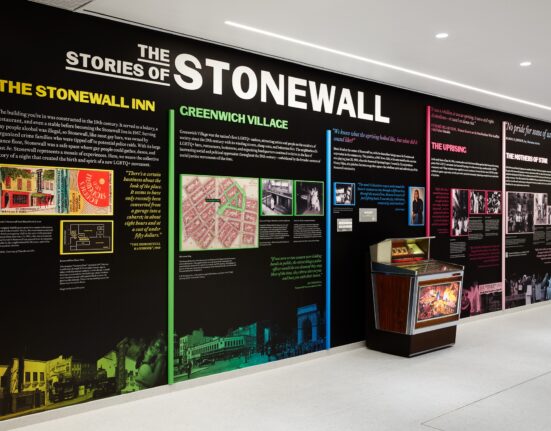British actor Joe Alwyn, 27, is already accomplished, and his career is about to explode even further. With roles in four feature films, including “Operation Finale,” “Boy Erased,” “Mary Queen of Scots” and “The Favourite,” he is current recognized most for his role in “Billy Lynn’s Long Halftime Walk.”
“The Favourite,” directed by Yorgos Lanthimos and written by Deborah Davis and Tony McNamara, is set to release on November 23. Featuring some of the biggest stars on the planet today, including Olivia Colman, Emma Stone, Rachel Weisz, Nicholas Hoult, James Smith, Mark Gatiss and Alwyn, it will surely reach Academy Award status.
Alwyn innocently walked into a suite in Whitby Hotel, appearing anxious to answer our questions.

How did “The Favourite” differ from everything else that you’ve done this year?
Everything was different with “The Favourite.” “The Favourite” is different. Yorgos is just such an interesting, singular, unique director. He has such a different vision from anyone else making films, I think. That alone kind of set it apart. It was the script that I actually read a while ago, I think in 2015. It’s just very refreshing and unlike anything I read, particularly in terms of period films. It had this kind of irreverent twist to it, almost modern, and I knew that he was attached to it when I read it. I could see it in his very skewed mind. I just wanted to be a part of it.
How do you think Britain will react to it?
I don’t know. I mean, I’m British. I think they will just enjoy it. I don’t think people will be too caught up in how it portrays the royal family. I kind of hope they will enjoy it as a different, weird, special kind of film. I don’t know how people who love the royal family will take it, but we will find out very soon.
Did you research your role?
I started to, and then Yorgos was like, “What are you doing?” We had a two-week rehearsal, and I think people turned up expecting to talk in the rehearsal about the period, the history and the characters. But he didn’t want to do that at all. He was very clear about that. He clearly wasn’t trying to capture a moment in time perfectly. He wasn’t making a documentary. He just wanted to explore these kind of crazy characters and crazy relationships. So instead of looking at the usual things you might look at as an actor, the character and the etiquette of the time and the intentions, he constructed a series of exercises over the two weeks that meant we got to know each other very well and completely humiliate ourselves in front of each other, so that when we were shooting we were willing to just jump in and give it a go and not look silly in front of each other. So it was more about that than studying.

Can you talk about the scene where you were fighting with Emma?
It was a lot of fun. It was the kind of thing that we thought we would try to rehearse for and try to kind of plot and block in a room a few weeks before. But then when you turn up in a forest with trees, there is only so much you can do in a room. Yorgos had sent us some clips from other films—an old Greek film with a chase scene in it on the beach, and the two people on the beach were just realistically chasing each other. They were diving after each other and being as scrappy as possible. I think he just wanted us to do that, so we did. We definitely got some bruises, but it was fun.
Can you expand on those humiliating activities during rehearsal?
They were unconventional. We would be switching parts, so I would be reading Abigail for example, and Olivia would read Nick’s part, and we would be changing roles, and we would be reading it almost like a play. Having us doing that, he would have all these exercises of us dancing or doing these weird physical activities like linking our bodies together, with music on. Just like this strange construct to make ourselves not get caught up in what we were doing. They sort of physically and literally brought us closer together so that we didn’t have any issues about anything on the set. I don’t think people knew why we were doing it or what he was going for. Maybe we still don’t.
Obviously Yorgos has a brilliant but demented mind when it comes to filming. How familiar were you with his work?
I was pretty familiar. I’ve seen all of his films, and I really, really loved them. I was interested about this as well, because I guess it’s the first film of his which is based on a true story, and it’s a period film. In his other projects he constructed kind of these strange realities for the stories, so I wondered how it would translate in a real setting. With that said, the script was so different, but there still seems plenty of room for him to still have his hallmark stamp on it. Once we got into it, the film seems very clear, and it still very much fits within his world, even though it’s a departure to a degree.
Was there a favorite part of the movie for you?
It’s always interesting seeing bits that you’re not in. It’s [those] that you’re not in, that you read or see in a rehearsal of—it’s always interesting to see how they turn out. There were moments I loved: seeing Olivia descend into her state of madness, like when she was crying through the halls and holding the baby. That whole side of it, the tragic side of it, with the miscarriages, to actually see it and realize it through her performance and through the way that he told the story, I liked those moments.
Were you familiar with this time in history before the film?
No, not me.
You’ve been working on stuff for two years. How did they all happen to come together now?
There were four films. I did them all last year. “The Favourite” was the first, then there was “Mary Queen of Scots,” and then “Boy Erased” and “Operation Finale” I did together. I just feel fortunate to be in films that people feel excited to be seeing. It’s nice that people are looking forward to seeing them, especially with “The Favourite” film, because everyone’s enjoying seeing it. I hope and I think so. To be a part of that, it’s just great. I mean, those kinds of scripts don’t come around very often.
Especially for someone so early in their career, the opportunity to work with someone like Yorgos, who is unlike anyone else, to work with a cast like that—I’m just very fortunate.
What did you enjoy most about his directing?
I like the fact that he didn’t let us get too caught up in the academic side of trying to approach acting. He was liberating in the sense that he does not give much direction, and so once you give yourself over to that, you hopefully don’t get too stuck in your mind what to do, and you just go with it. I thought that was great.

What are you looking forward to in terms of when general audiences experience this, especially for the first-time watchers of this director?
I do think that it’s maybe more accessible in a way then some of his past films. I think that his other films are brilliant and are accessible in a different way. But I think in “The Favourite” you can latch onto the characters.
There is maybe more emotion to hold onto. I just think it’s a really different, unique film. I think it’s funny, and also dark, and a little violent, and sexy, and weird. It’s just something that people aren’t used to seeing, I hope.
Did you walk away from this experience with anything that you’re going to hold onto for life?
Yeah, the whole experience. I’m sure many things. Every time you make something, especially when you’re working with someone for a long period of time, you enter this little bubble, this little world with these people, and it feels like a really special one.
You are all over the place. Did you ever expect that your career was going to blow up like this?
I didn’t really have any pre-conceptions of what would happen. I felt spoiled. My first job was unbelievable, and I would jump to work with someone like that in any size part, in anything. So I felt lucky for that to have happened. Going forward I just wanted to try and find filmmakers who knew what they wanted to make and had a really clear vision of what they wanted to make, and that interested and excited me, like Yorgos. In the beginning you were just building your career, and I wanted to be in interesting projects. If there was a huge job that really came around, I would take it, but with these four projects, really exciting projects don’t come around often. I just wanted to be a part of those kinds of things.
Was Emma fun to work with?
Oh yeah, so fun. She’s not only ridiculously talented but such a down-to-earth, generous, funny person.
Your rise to fame has been so quick. How do you react when people come up to you—is it weird to you, or are you assimilating?
It doesn’t happen that often. It’s not something I really think about. I don’t feel any different as a person. I don’t feel like any sizable shift. The thing that feels different is people saying, “How do you feel?” It’s what people kind of project onto it; that’s the thing that changed rather than me changing, I feel.
What do you look forward to in the future, because you’re working with so many different directors now. Are you getting the directing bug in you at all?
Not at the moment. It’s really interesting seeing how people work differently. Maybe some time down the line I’d like to try it, but at the moment my acting is the most important.
You’ve done two films regarding royalty, this one and “Mary Queen of Scots.” How do you feel about the subject?
People are just fascinated by it, I guess. It’s kind of an unreachable, mysterious family and life. So there were so many stories in it that are real and also fictitious. People sort of have an inexhaustible interest in the royal family. But “The Favourite” and “Mary Queen of Scots” could not be more further apart, as far as stories about the royal family and the way they are told. I didn’t feel like I was just doing the same thing again.

